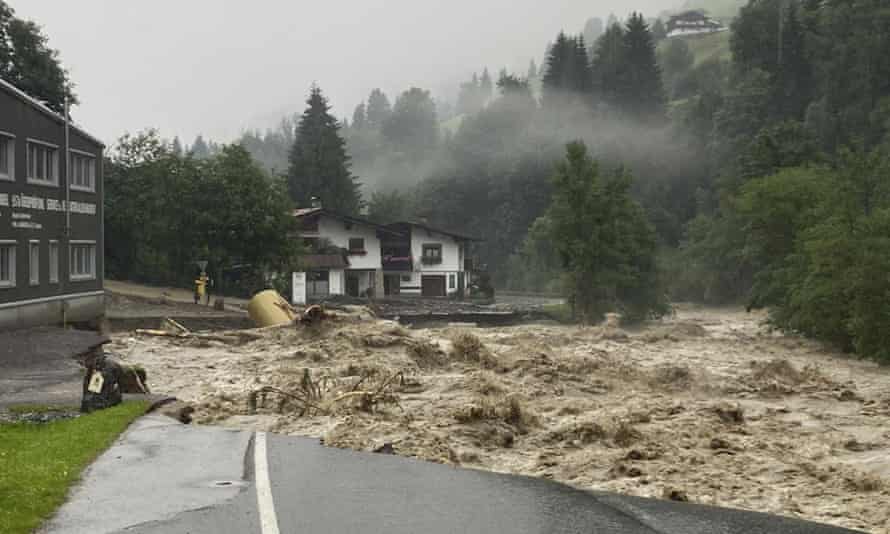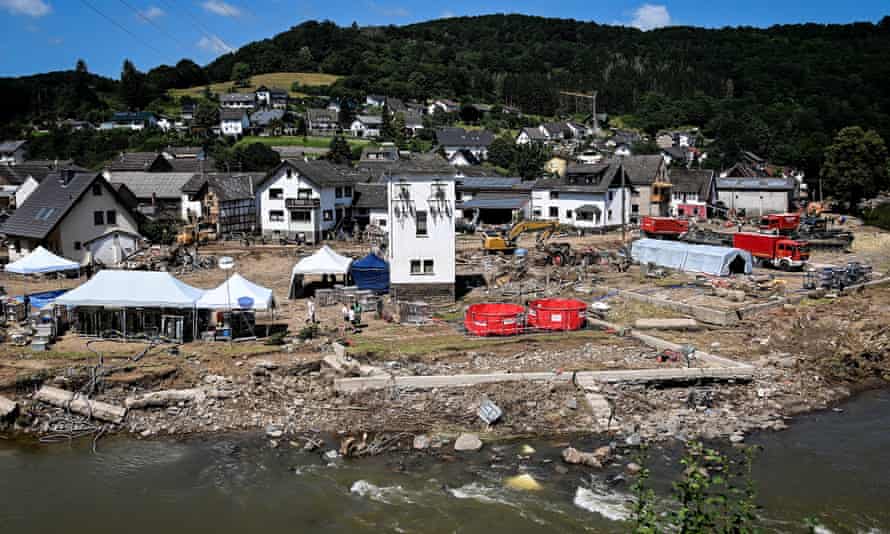Chancellor Angela Merkel has said Germany must up its pace in tackling the impact of the climate crisis, after more flash floods devastated towns in eastern Germany, Bavaria and Austria over the weekend.
While one flood in itself was not an indicator of the climate crisis, Merkel said during a visit to one of the two regions in western Germany hardest hit by last week’s record rainfall, the number of such extreme weather events had increased in recent years.
“We have to up the pace in the fight against climate change,” the German leader said.
The Alpine district of Berchtesgadener Land became the latest region to be affected by floods on Saturday evening, after heavy rainfall led to flooded streets and landslides, leaving at least one person dead.
Across the border in Austria, a brook swollen with rainwater flooded the historic centre of the town of Hallein, south of Salzburg, trapping residents in their buildings, upending cars and inundating ground-floor shops. The town’s mayor, Alexander Stangassinger, told the broadcaster ORF the floods had caused damage worth millions of euros.

Several towns in the hilly eastern German region of Saxon Switzerland, south-east of Dresden, were also cut off and train services to the Czech Republic disrupted. Rainfall in the catchment basin of the Kirnitzsch, Polenz, Sebnitz and Wesenitz tributaries exceeded 100 litres a sq metre over the course of 24 hours, authorities reported, leading the waters to break the rivers’ banks.
Intense rainfall last week claimed the lives of at least 184 people in western Europe. On Wednesday and Thursday, a near-stationary low-pressure weather system over parts of western Germany brought intense rainfall and floods, with 110 people killed in the state of Rhineland-Palatinate, a further 45 in North Rhine-Westphalia (NRW) and at least 27 in neighbouring Belgium. At least 670 people were injured.
Germany’s main provider of public railway services, Deutsche Bahn, said the storms and floods had caused damage to over 80 of its stations and more than 600km of tracks.
During her visit to the affected areas in western Germany, chancellor Angela Merkel on Sunday described a “surreal, ghostly situation” in the village of Schuld in Rhineland-Palatinate state, where floods had ripped through buildings, washed away cars and trapped people in their homes.
“The German language barely has words for the devastation that has been wrought here,” Merkel said during her joint visit with Malu Dreyer, the state premier.

She pledged quick financial aid to the region and vowed to return to Schuld in August. Her finance minister, Social Democrat chancellor candidate Olaf Scholz, on Sunday promised at least €300m to the victims of the natural disaster.
“Germany is a strong country,” Merkel said. “We will stand up to this force of nature, in the short term, but also in the medium and long term.”
The floods have hit Germany two months before federal elections that will determine a successor to Merkel, who is stepping down after 16 years in office.
The conservative frontrunner to step into her shoes, Armin Laschet, the leader of the Christian Democratic Union (CDU), on Thursday interrupted a party meeting to attend flood-hit areas in NRW, the populous western state he represents as premier.
While visiting the devastated town of Erftstadt, where an eroded gravel quarry had swallowed cars, bits of road and entire buildings, Laschet was on Saturday caught sharing jokes with bystanders while the German president, Frank-Walter Steinmeier, solemnly addressed the cameras.
Lars Klingbeil, the general secretary of the centre-left Social Democratic party (SPD), called Laschet’s behaviour “lacking in decency and appalling”. The broadcaster WDR commented that every election campaign offered a few moments “in which the candidates show their true colours”, adding: “Today is such a moment.”
Laschet tweeted an apology on Saturday afternoon. “The fate of those affected, which we heard about in many conversations, is important to us,” he wrote. “So I regret all the more the impression that arose from a conversational situation. That was inappropriate and I am sorry.”
The Green party’s candidate for chancellor, Annalena Baerbock, who has struggled to centre the national conversation around ecological issues after a strong start to her campaign, cut short her holiday to visit affected areas but declined to be accompanied by the press.
Mass tabloid Bild, which makes no secret of its distaste for the idea of a Green victory in September, warned against “politicising” the floods. “What no one needs right now is a stupid, ideological blame game and campaign soundbites that instrumentalise the brute force of nature for political ends,” wrote Bild’s editor-in-chief Julian Reichelt in a comment piece. “You overcome catastrophes through unity, not division.”
By contrast, the regional public broadcaster in the affected parts of Germany, WDR, said it was inevitable that the floods will take centre stage as the country’s election campaign enters its hot phase. “Weather is highly political, there is barely such a thing as apolitical weather.”
A high pressure system over the British Isles is promising to alleviate concerns about further rainfall by bringing dry and sunny summer weather to Germany in the coming week, the German Meteorological Service announced on Sunday. The weekend could see a return of stormy weather in Germany’s south-west, however.
Average Rating